- Echanges et mise en réseau
- Connaissance et apprentissage
- Plaidoyer
- Nos thèmes
Medicus Mundi Suisse fête son 50e anniversaire : plein de fierté, avec une réflexion autocritique et en se tournant vers l'avenir.
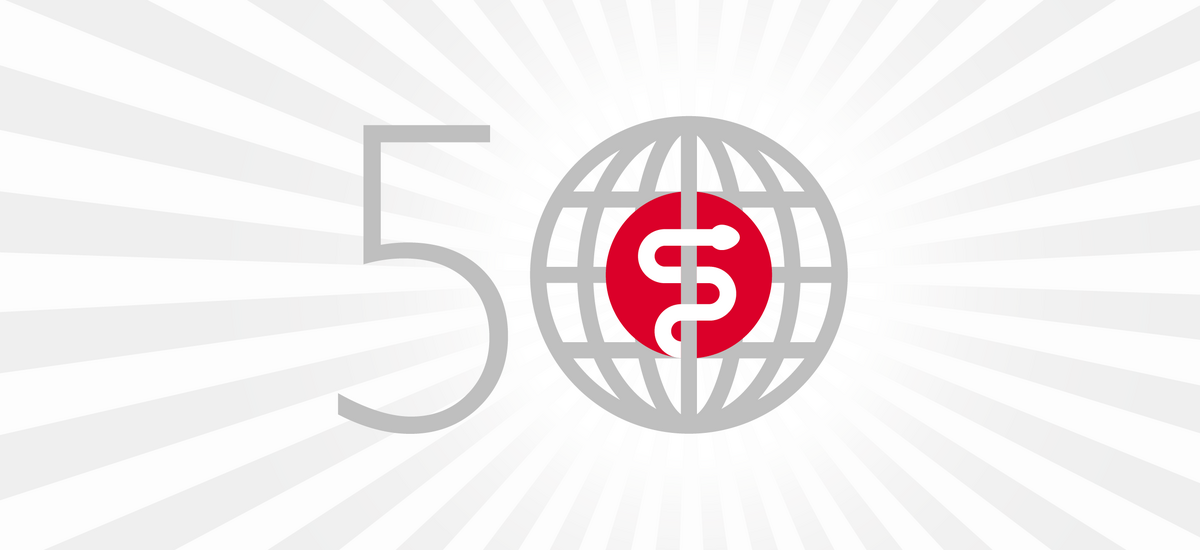
En 1973, quelques organisations suisses de la coopération internationale en matière de santé et l'Institut tropical suisse (Swiss TPH) de Bâle ont fondé le Réseau Medicus Mundi Suisse. Ce Réseau, créé il y a 50 ans dans le but de préparer les médecins (hommes et femmes) à leur engagement dans ce qui était appelé à l'époque le tiers-monde, est constitué aujourd'hui d'environ 50 organisations membres et institutions scientifiques. MMS concentre les savoirs de ces organisations, permet des processus d’acquisition des connaissances et d'apprentissage pour le travail en faveur du droit à la santé au niveau mondial. Il conduit également le dialogue politique en Suisse sur les thèmes de la santé globale, afin que les acteurs et actrices locaux assument leurs responsabilités pour garantir le droit à la santé.
En cette année anniversaire, nous sommes fiers de montrer l’importance de notre démarche - mais nous ne serions pas MMS si nous ne profitions pas de l'occasion pour mener courageusement une réflexion autocritique. Nous voulons analyser de plus près notre parcours comme organisation et le rôle tenu par la société civile dans la coopération internationale en matière de santé, aujourd'hui et à l'avenir.
Nous sommes parfaitement conscients des racines historiques de la coopération internationale en matière de santé et de la santé globale. L'année dernière, nous avons organisé une table ronde sur la décolonisation au sein de la coopération internationale et publié en décembre, dans le Bulletin MMS, un numéro très instructif sur ce thème. Nous souhaitons à présent établir un rapport sur l'évolution du secteur, sur les modèles d’une coopération décolonisée qu’on pourrait mettre en place à l'avenir et sur la manière dont nos membres se préparent à ce changement.
Le 2 novembre 2023, nous discuterons des résultats de cette étude avec un large public lors de notre symposium anniversaire. À cet effet, nous nous appuierons aussi sur notre réseau international Medicus Mundi International qui fête cette année son 60e anniversaire.
Martin Leschhorn Strebel
Réseau Medicus Mundi Suisse
E-Mail

L’initiative parlementaire « Pour que l’avortement soit d’abord considéré comme une question de santé et non plus une affaire pénale »
"La Commission des affaires juridiques du Conseil national (CAJ‑N) n’est pas prête à sortir l’interruption de grossesse du Code pénal. Lors de sa séance du 2 février, elle a refusé de donner suite à l’initiative parlementaire (22.432) « Pour que l’avortement(1) soit d’abord considéré comme une question de santé et non plus une affaire pénale » par 14 voix contre 11. SANTÉ SEXUELLE SUISSE (SSCH) considère cette décision peu courageuse de la CAJ‑N comme une occasion manquée de procéder à cet ajustement nécessaire et appelle le Conseil national à corriger cette décision."

"Les organisations de santé sexuelle suisses ont déposé mardi une pétition à Berne. Elle demande que la notion d'interruption de grossesse soit sortie du Code pénal pour figurer dans une loi qui met l'accent sur la santé sexuelle. Une manière d'effacer la stigmatisation, selon la directrice de Santé sexuelle Suisse Barbara Berger."
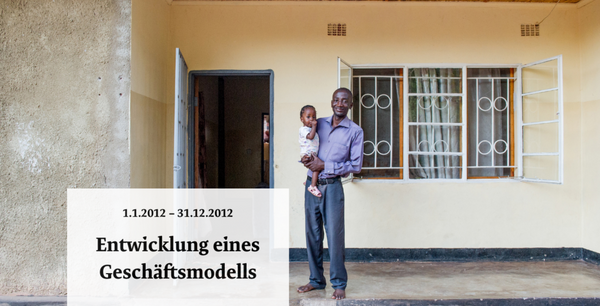
Since 2012, SolidarMed has been building houses for staff with the support of the Hilti Houndation to provide attractive accommodation at remote healthcare facilities.
"At many health centres and hospitals in rural Zambia, there is a lack of accommodation for healthcare workers and their families, which makes recruiting and retaining good medical staff a challenge. Since 2012, SolidarMed has been building homes for staff with the support of the Hilti Foundation so that rural healthcare facilities can also offer attractive housing for staff. In this way, SolidarMed is working to tackle the acute shortage of healthcare workers in rural areas. In 2024, the investment and development project is to become an independent social enterprise."
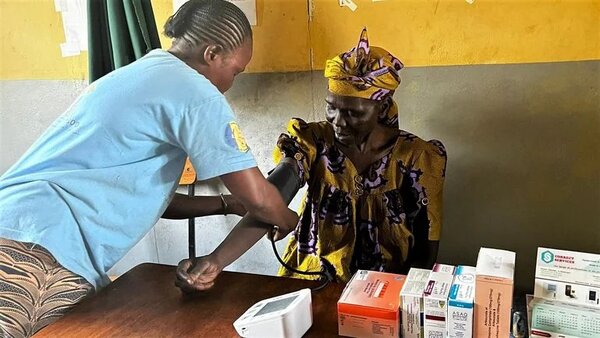
Swiss TPH designs and implements health insurance solutions
"Every year, 100 million people are pushed into poverty because they have to pay out of pocket for healthcare. To make sure that people can access health services without financial hardship, many countries have committed to ensuring universal health coverage and social protection. Swiss TPH provides tailor-made support to these countries."
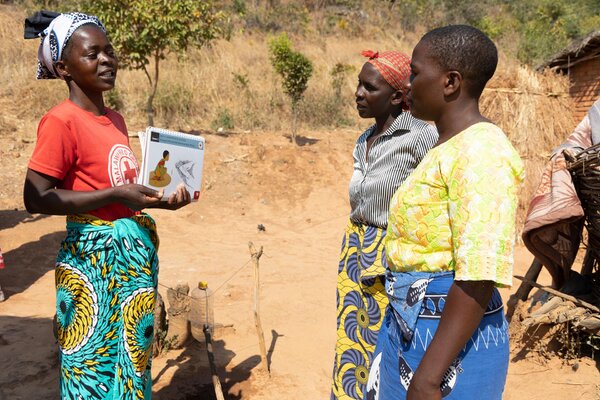
"Six spécialistes de la Croix-Rouge effectuent une première mission au Malawi pour y endiguer l’épidémie de choléra la plus meurtrière de ces vingt dernières années. Depuis quelque temps, le nombre d’infections explose. La Croix-Rouge suisse (CRS) coordonne l’équipe internationale de réponse au choléra qui vient en renfort à la Croix-Rouge du Malawi. (...) Les équipes ont pour mission d’appuyer et d’étendre les mesures prises par la Croix-Rouge du Malawi. L’accent est mis sur le renforcement des structures à travers la formation de bénévoles. Ces derniers mettent en place, dans leurs villages respectifs, des points d’accueil destinés au tri des malades."
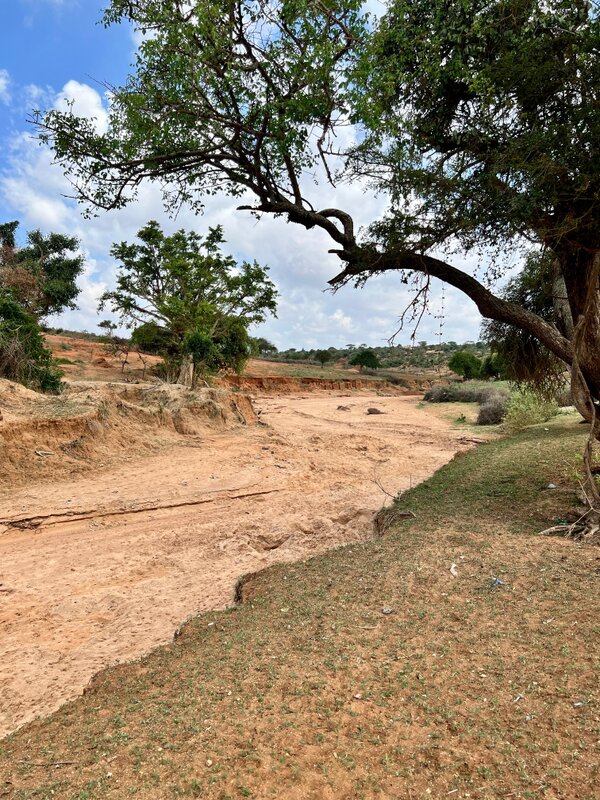
"Des millions d’animaux morts, des sols arides, des rivières asséchées: dans le sud de l’Ethiopie, il n’a pas plu depuis 2020. La crise alimentaire contraint toujours plus de personnes à la fuite. Allocations en espèces, eau et hygiène: la Croix-Rouge tend la main aux plus vulnérables. (...) La sécheresse persistante a plongé de vastes régions d’Afrique dans l’une des crises alimentaires les plus graves de ces dernières décennies. Le sud de l’Ethiopie est très durement touché. Le pays compte à lui seul plus de sept millions de personnes tributaires d’une aide alimentaire. L’ampleur des phénomènes naturels n’a fait que croître au cours des dernières années: ici, le changement climatique est une réalité amère."
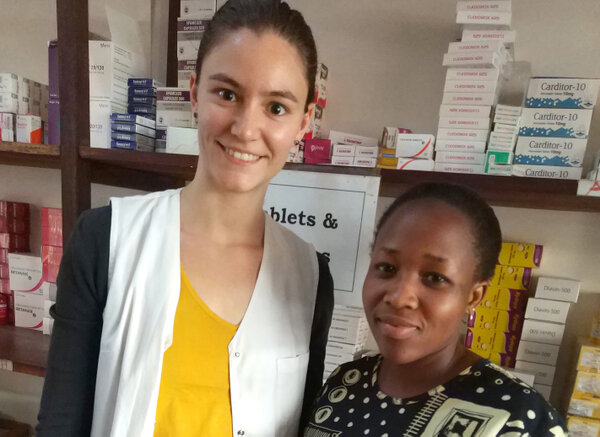
For 30 years, Pharmaciens Sans Frontières Suisse (PSF Switzerland) has been committed to improving access to essential medicines. We help vulnerable populations in Switzerland while developing partnerships with medical structures abroad. In South Sudan, Lebanon, Madagascar and Tanzania PSF Switzerland is involved in development aid projects. If you are a Swiss pharmacist and would like to volunteer in the field or if you just want to know more about our activities, please visit our website or follow us on social networks: - Instagram; - Facebook and - Linkedin (Links see below).
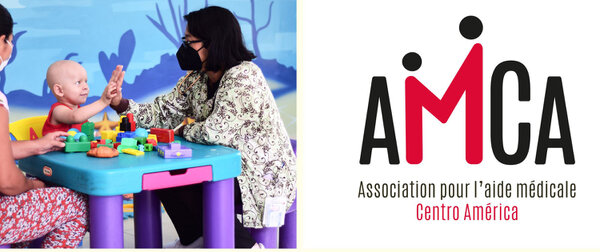
Un nouveau logo permet d’affirmer son identité, son positionnement et ses ambitions. C’est pourquoi AMCA Vaud a décidé, en 2022, de revoir son identité, en collaboration avec son association sœur AMCA au Tessin, pour être en phase avec son développement depuis sa création en 2019.
"Ce changement de nom et de logo a aussi pour objectif de mieux affirmer les synergies et le travail solidaire entre les deux associations qui partagent certains projets, notamment au Nicaragua. Il est ainsi essentiel d’avoir une communication cohérente entre les 2 AMCA, tout en gardant les différenciations nécessaires puisqu’il s’agit de deux associations indépendantes juridiquement. Avec cette identité commune, nous allons pouvoir capitaliser sur nos forces respectives pour développer les projets communs (environ 80% des projets), mieux communiquer avec les plus jeunes générations, et élargir pour notre part le périmètre géographique des donateurs/trices dans toute la Suisse romande." Pour plus d'informations, voir le PDF!
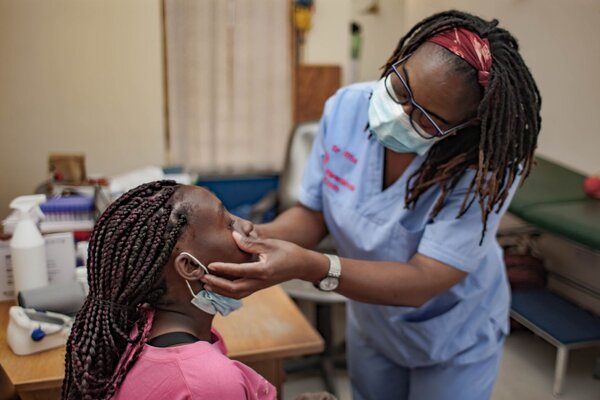
Beim Engagement gegen die HIV/Aids-Pandemie in Simbabwe setzt die Ruedi Lüthy Foundation auf gut ausgebildetes Pflegefachpersonal. Neben Aus- und Weiterbildungskursen in der Hauptstadt Harare sorgt die Schweizer Stiftung auch dafür, dass das Fachwissen in entlegene Regionen des Landes gelangt.
«Nurse at the forefront» lautet das Konzept der Newlands Clinic in Simbabwe. (...) Mit ihrem Fokus auf die Pflegefachpersonen geht die Newlands Clinic in Simbabwes Hauptstadt Harare seit ihrer Eröffnung im Jahr 2004 neue Wege. Als Ruedi Lüthy die Klinik eröffnete, war die Behandlung von HIV/Aids-Betroffenen fast ausschliesslich Ärzt:innen vorbehalten. «Professor Lüthy aber glaubte an uns Pflegefachpersonen und setzte uns an vorderster Front ein», erinnert sich Nicola Willis, eine ehemalige Pflegefachfrau der Newlands Clinic: «Er hat der Welt bewiesen, was alles möglich ist, und die HIV-Behandlung in meinen Augen revolutioniert.»
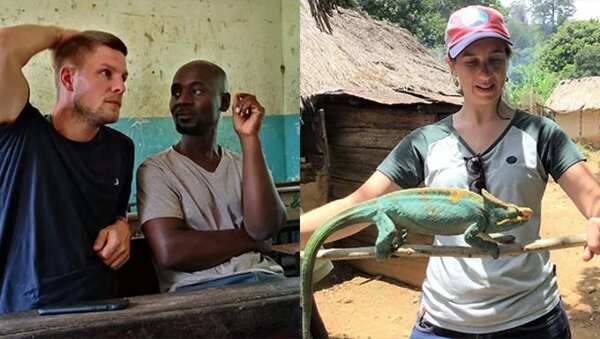
" Researchers Lorenz Hofer and Mgeni Tambwe are trying to stop malaria transmission in Tanzania. Astrid Knoblauch is distributing drugs to combat tuberculosis with the help of drones in Madagascar. For this, the R. Geigy Foundation awards them with the 12th R. Geigy Award 2022, endowed with CHF 20,000. In memory of the biologist and founder of the Swiss Tropical and Public Health Institute (Swiss TPH), Rudolf Geigy, the Foundation awards this prize every two years to young researchers and public health specialists who distinguish themselves through outstanding achievements in the field of poverty-related and neglected tropical diseases."
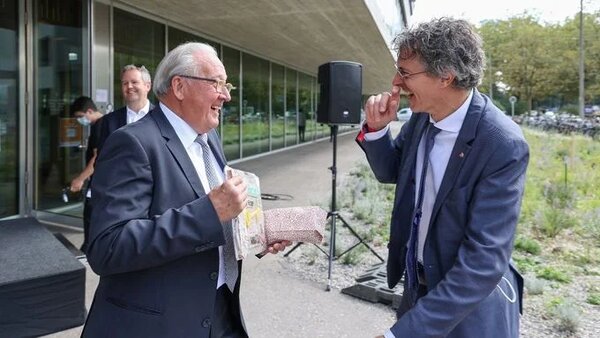
"The R. Geigy Foundation Board elected Jürg Utzinger, Director of the Swiss Tropical and Public Health Institute (Swiss TPH), as the new President of the R. Geigy Foundation as of 1 January 2023, succeeding Marcel Tanner, who chaired the Foundation for 25 years. "I am delighted to be leading the R. Geigy Foundation as President from January 2023," said Utzinger. "Over the past decades, the R. Geigy Foundation has developed into a strategically important vessel for Swiss TPH. Especially young researchers have been able to benefit from targeted start-up funding, which allowed them to propel their potential."
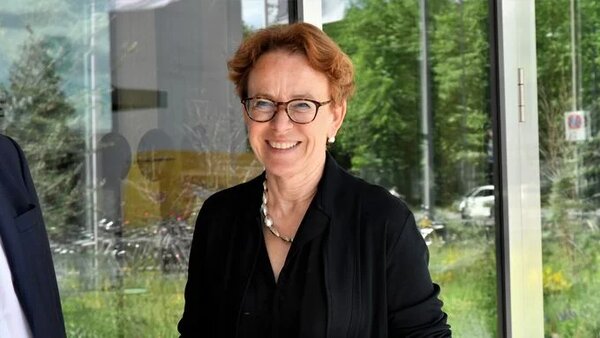
"The governments of the two Basel cantons have elected Eva Herzog, member of the Council of States of Canton Basel-Stadt, as the new President of the Board of Governors of the Swiss Tropical and Public Health Institute (Swiss TPH). Herzog will begin her new role on 1 January 2023. The Board of Governors is the highest decision-making and supervisory body of Swiss TPH. The President is jointly elected by the governments of both Canton Basel-Stadt and Basel-Landschaft."

« Décolonisation de la santé globale » est un mouvement qui lutte contre les systèmes de domination et de pouvoir profondément enracinés au sein des organisations et institutions internationales, occidentales pour la plupart. Cette critique met en évidence l'origine coloniale de la coopération au développement, qui imprègne encore aujourd'hui sa manière de penser, sa structure et sa pratique. Alors que de nombreuses organisations décrivent depuis longtemps leur travail non plus comme une "aide", mais bel et bien comme une coopération égale avec leurs partenaires des pays du Sud, les pratiques de travail concrètes sont encore trop souvent basées sur des structures de pouvoir établissant des dépendances et empêchant le développement des ressources locales. Les articles de ce Bulletin MMS montrent ce que signifie laisser derrière soi les structures coloniales dans la coopération internationale en matière de santé et quels sont les défis liés à un tel processus de transformation.

Appel d’Urs Ruckstuhl, psychologue spécialisé en psychothérapie et co-auteur d'une lettre ouverte aux autorités et aux politiques contre le système d'aide d'urgence inhumain de la Suisse
La situation des requérants d'asile déboutés en Suisse est insupportable. Elle est comparable à un wagon condamné sur une voie de garage. Les personnes déboutées sont exclues de l'aide sociale et vivent de l'aide d'urgence qui est largement inférieure au minimum vital et ne répond pas aux normes humanitaires et des droits humains. La loi n’offre que peu de marge de manœuvre. Un groupe s'engage pour une humanisation des conditions de vie des requérants d'asile déboutés.
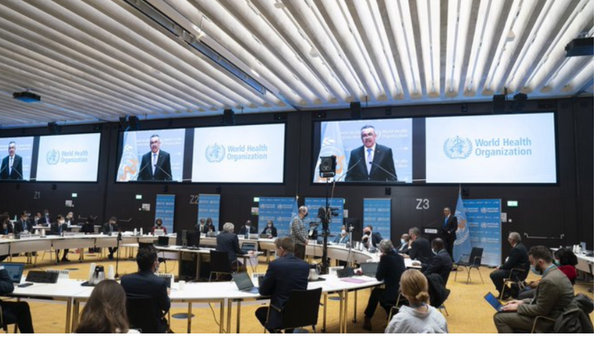
"The World Health Organization’s Executive Board is holding its 152nd meeting in Geneva from January 30 to February 7. The Board’s decisions will set most of the agenda to be addressed by WHO during the year, and include health emergencies, progress reports towards Universal Health Coverage, and the state of rehabilitation services, among other things. Despite a cramped agenda, health activists have warned that key problems are being left unaddressed by the Executive Board. These include structural hurdles in the way of achieving Health for All, including the increasing influence of the corporate sector on matters concerning global health. While this affects all of WHO’s fields of work, one of the most hit is nutrition. Tackling malnutrition and hunger has been at the top of the organization’s agenda for decades, but effective action is still missing.
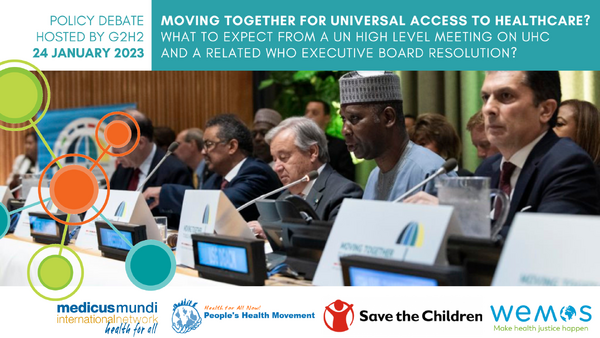
"In the political declaration of the 2019 UN High-Level Meeting (UN HLM) on Universal Health Coverage “Moving Together to Build a Healthier World”, world leaders committed for all people to have access to quality essential health services and quality, safe, effective, affordable, and essential medicines, vaccines, diagnostics, and health technologies, without experiencing financial hardship and without discrimination by 2030. At the time, a number of civil society organizations criticised the political declaration which was considered a weak and unspecific wish-list that would not lead to any substantive change in people’s access to healthcare. Four years later, the World Health Organization and governments prepare for another UN HLM on UHC and a related World Health Assembly resolution. But the reality is dire: we have not “moved together” and the world is certainly not healthier. The COVID-19 pandemic has further weakened health systems and it has revealed the consequences of deep inequities, economic and financial injustice, commercialisation of healthcare, and the lack of solidarity and international action."

"Geneva – The Medicines Patent Pool (MPP) today announces its new strategy 2023-2025 to reduce access inequities, by improving the availability and affordability of health products in low- and middle-income countries (LMICs), to facilitate the development of needed formulations for the most vulnerable, and to support the development of diversified and sustainable manufacturing capacity in LMICs. Today, the fundamental healthcare needs of billions of adults and children are not being met. Adults and children are suffering and dying from treatable conditions because half of the population living in LMICs still cannot access essential medicines and healthcare and millions of people face catastrophic health expenditures that drive them into poverty."
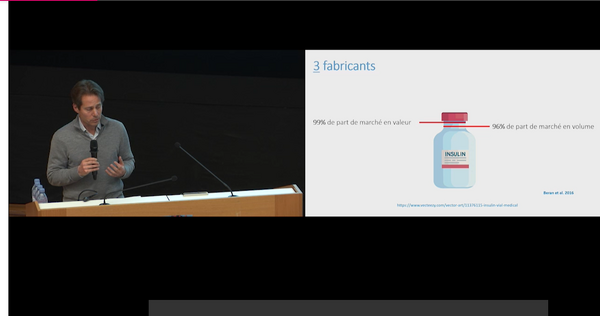
Video de l'événement avec Chappuis François, Flahault Antoine, Londeix Pauline, Martin Jérôme, Beran David, Addeo Alfredo
"L’accès aux médicaments essentiels– un élément fondamental du droit à la santé, reste une problématique en raison de leur prix, de la disponibilité et si les médicaments sont abordables. Pourquoi est-ce un défi global ? Quelle est la situation en Suisse ? Quelles sont les solutions ? A cette occasion, Prof. Antoine Flahault, directeur de l’Institut de santé globale à la Faculté de médecine de l’UNIGE, se chargera de l’ouverture de l’événement."

"The world has lived through an extraordinary global health threat, the COVID-19 pandemic, leading to nearly 20 million deaths, staggering economic losses, a generational decline in human capital, and the first decline in global life expectancy since 1950 (the first year when UN estimates were published). Another major threat, climate change, now has broad scientific, political, and social recognition. The spectre of nuclear confrontation has re-emerged as a serious threat during the ongoing Russian invasion of Ukraine. The three Cs—COVID-19, climate change, and conflict—highlight that the steady global health progress of the past 70 years will not necessarily continue in the next 70 years. But there are many other threats beyond the three Cs that threaten to undermine future global health progress, including rising antimicrobial resistance, increasing obesity, inverted population pyramids, eroding sexual and reproductive rights for women, food insecurity, and fraying multilateralism. How global health advances or retreats will depend crucially on the multiplicity of these threats and how they intersect."

„A clear vision for a wellbeing economy within planetary boundaries that considers international solidarity and social justice will have to guide the development of future health systems." Think piece by Dr. Remco van de Pas.
"The German, and most European health systems are part of an economic system that lacks intrinsic sustainability outcomes, with respect to society, health or ecology. The German health care sector is responsible for 5.2% of the national greenhouse gas emissions.1 51 out of 1,000 patients with diabetes are hospitalised, and this is one of the highest European admission rates for a condition that can be avoided by proper preventive measures in ambulatory care.2 Since 2013, the share of foreign nurses in the German nursing workforce has increased from 5.8% to 11%, and can arguable be regarded as a form of braindrain from the Global South. These examples are interrelated, as will be clarified in this think piece."
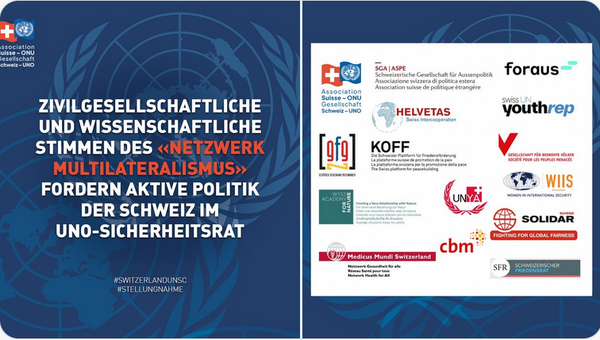
Des voix issues de la société civile et de la communauté scientifique appartenant au « Réseau multilatéralisme » appellent à une politique active de la Suisse au Conseil de sécurité de l’ONU
"A partir du 1er janvier 2023 et en tant que membre non permanent du Conseil de sécurité de l’ONU (CSNU), la Suisse assumera pour deux ans des responsabilités au sein de l’organe principal des Nations Unies responsable de la sécurité internationale et de la paix. Nous attendons de la Suisse qu’elle poursuive une politique active et ambitieuse dans l’esprit de la Charte des Nations Unies, sur la base de l’article 54 de la Constitution fédérale. En tant qu’acteurs de la société civile et de la communauté scientifique, nous saluons les quatre priorités fixées par le Conseil fédéral pour la présence de la Suisse au Conseil de sécurité, ainsi que l’affirmation selon laquelle les droits humains sont étroitement liés à ces priorités. Car, à nos yeux, siéger au CSNU ne doit pas être une simple question de prestige. La Suisse doit poser des accents clairs et ne pas rester passive ou vague sous couvert de sa neutralité."
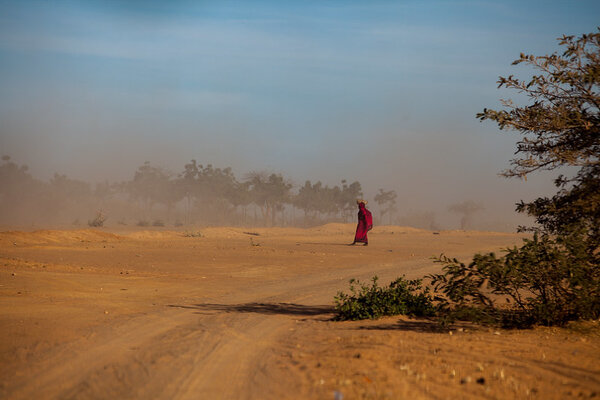
Viele Bürgerliche liebäugeln mit Einsparungen. Dabei ignorieren sie die Interessen vieler: der Bedürftigen, der Schweiz – und diejenigen ihrer Wählerbasis.
"Verschiedene Mittel erlauben es der Schweiz, sich in der Welt zu positionieren: Handelsbeziehungen, Diplomatie, Entwicklungszusammenarbeit. Letztere wird im Parlament oft kontrovers diskutiert – zu häufig aber nur als Kostenfaktor in den Budgetdebatten. Dabei geht gern vergessen, was die Entwicklungszusammenarbeit leistet. Das Engagement für die globale Entwicklung stärkt die internationale Reputation der Schweiz und wird regelmässig von der OECD und anderen Experten mit guten Noten gewürdigt. Denn: Mit sorgfältig durchgeführten Entwicklungsprojekten rettet die Schweiz Leben und schafft Perspektiven für Menschen in Armut. Damit leistet sie einen wichtigen Beitrag zur internationalen Stabilität und Sicherheit."
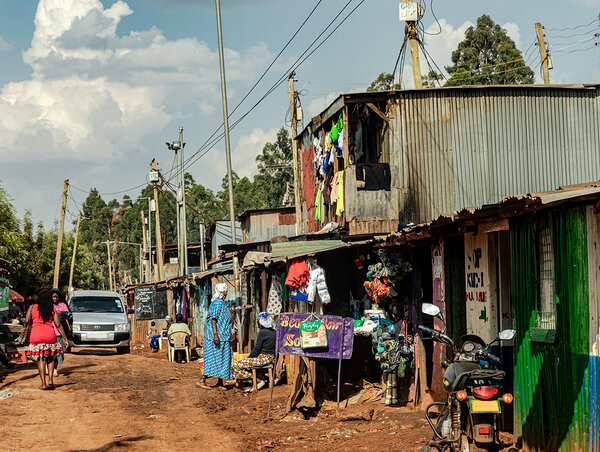
Aktuell sind 135 Länder in Asien, Afrika, Lateinamerika und Osteuropa kritisch verschuldet.
"Die Zahl der kritisch verschuldeten Länder im Globalen Süden ist vor dem Hintergrund der Corona-Pandemie von einem vorher bereits hohen Niveau noch einmal leicht angestiegen: auf 135 von 148 untersuchten Staaten. Das sind drei Länder mehr im Vergleich zur Prognose aus dem letzten Jahr. Zudem wurde die bereits kritische Situation einer größeren Anzahl von Ländern weiter zementiert. 97 der 135 Staaten befinden sich in besonders kritischen Kategorien, 13 Prozent mehr als im letzten Schuldenreport prognostiziert. Die Hoffnung auf eine schnelle Erholung hat sich vor allem im Globalen Süden nicht erfüllt. Im Unterschied zu den Vorkrisenjahren ist die Verschuldung im öffentlichen Sektor überproportional angestiegen."

Entre 2011 et 2020, l’aide annuelle de la Suisse visant à protéger le climat dans les pays en développement et émergents a plus que triplé. Trop beau pour être vrai ? Coup d'œil sur les comptes de la Confédération.
"Les inondations dévastatrices au Pakistan ne sont qu'un exemple parmi d'autres : les effets du réchauffement climatique sont chaque année plus marqués et visibles. Les pays les plus pauvres et les groupes de population les plus vulnérables sont souvent les plus durement touchés. Ils peinent à s'adapter aux changements climatiques, tant pour protéger leurs côtes des tempêtes et des inondations que pour adapter leur agriculture aux vagues de chaleur et à la sécheresse. (...) Le Nord mondial n'est pas seulement responsable de la crise climatique, il dispose aussi de la plupart des ressources financières, aussi bien pour la lutte contre le changement climatique (atténuation ou « mitigation ») que pour l'adaptation à ce dernier."

Rapport dans SAEZ d'Andréa Rajman sur le symposium MMS 2022
"Le monde et la santé globale sont confrontés à une crise multiple, causée par le changement climatique, la pandémie et les conflits. Ces événements ont un impact sur la santé, les déterminants de la santé et de la santé globale ainsi que sur le travail des ONG en matière de santé. Le Réseau Medicus Mundi Suisse a organisé un récent symposium sur ce thème." Source : Article paru dans le Bulletin des médecins suisses 49/50, le 7 décembre 2022"."
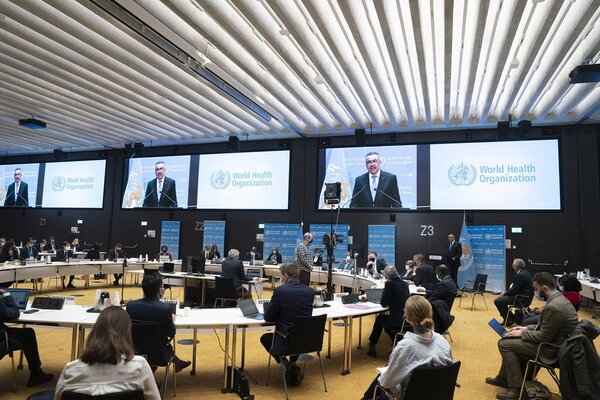
"The World Health Organization (WHO)’s ‘zero-draft’ of a pandemic treaty proposes that 20% of pandemic-related products – vaccines, diagnostics, personal protective equipment and therapeutics – should be allocated to the global body, which will then ensure their equitable distribution. The draft, which has been seen by Health Policy Watch, was sent to the WHO’s 194 member states this week, officially opening the door for negotiations on how the world should behave in future pandemics."
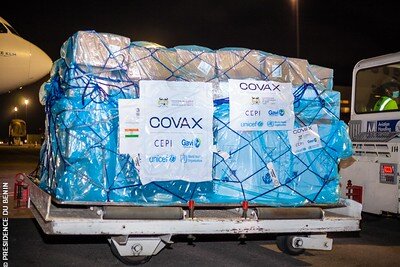
The treaty has the potential to “make a tremendous difference for the next pandemic”, says Suerie Moon, a researcher who studies global health policy at the Geneva Graduate Institute in Switzerland
"The World Health Organization (WHO) last week published a draft of the first legally binding treaty intended to ensure vaccines, drugs and diagnostics are shared more equitably around the world during the next pandemic, avoiding the deep divides seen during the COVID-19 pandemic. Researchers say that the document is an ambitious effort to address searing inequities that occurred during the pandemic, but that it doesn’t do enough to force countries to share scarce resources or punish those that don’t comply. “It has more heart and brain than I expected,” says Kelley Lee, scientific co-director at the Pacific Institute on Pathogens, Pandemics and Society in Burnaby, Canada. “But it still has insufficient teeth and an insufficient spine to ensure that we’ll definitely have a better response next time.“
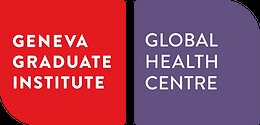
A series of periodic briefings on the state of global reforms for pandemic preparedness and response.
"Welcome to the inaugural issue of the Governing Pandemics Snapshot, a publication aiming to provide a concise, periodic overview on the state of efforts to strengthen global pandemic preparedness and response (PPR). This first issue looks back at 2022 and forward to 2023, examining three topics that will recur with each issue: negotiations towards a Pandemic Treaty (or instrument), amendment of the International Health Regulations; and Financing of PPR. Each issue will also cover a rotating special topic, and we begin here with Pathogen- and Benefit-Sharing (PBS). More frequent updates are available on our timeline at GoverningPandemics.org. Feedback is welcome at globalhealth@graduateinstitute.ch, and keep an eye out for our next issue in mid-2023."
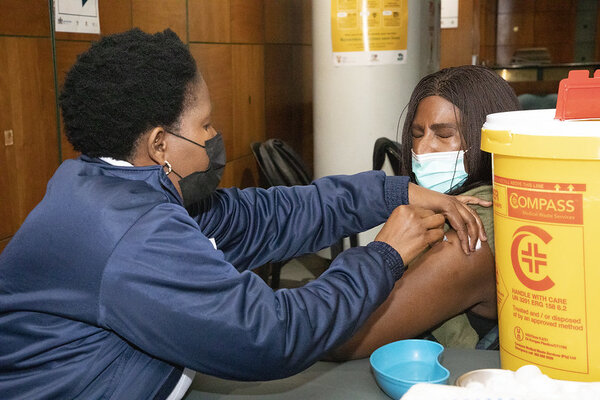
Par Chris Collins, Annette H. Sohn, Chris Beyrer, Mike T. Isbell, Quarraisha Abdool Karim et Allan Maleche
Jusqu'à présent, le dialogue mondial sur la PPR (préparation et réponse aux pandémies) a largement ignoré le rôle crucial joué par les programmes établis et spécifiques à une maladie dans les actions nationales et régionales de lutte contre le COVID-19, ainsi que le potentiel de ces programmes à contribuer à une PPR plus forte à l'avenir. La semaine dernière, nous (Chris Collins et al.) avons publié dans la revue PloS Global Public Health un article de synthèse qui met en évidence de nombreux points d'intersection entre la lutte contre le VIH et les priorités essentielles d'une PPR plus forte. L'avenir de la "santé globale" sera sur la table des dialogues du G7, du G20 et des réunions de haut niveau des Nations unies dans le courant de l'année. Les décideurs politiques devraient éviter de créer de nouveaux silos en matière de santé globale et investir plutôt dans les programmes existants qui rendent déjà les systèmes de santé plus inclusifs et résilients (dont les programmes du Fonds mondial, PEPFAR, ONUSIDA, etc.).

Communiqué de presse
"La pandémie de COVID-19 a révélé les faiblesses des réseaux mondiaux de sécurité sanitaire. Une approche globale «One Health» est essentielle pour prévenir, surveiller et répondre aux futures crises sanitaires. C'est ce que soutiennent les auteurs d'une série de quatre articles publiés hier dans The Lancet. Le Swiss TPH, avec sa longue expérience dans le domaine One Health, a contribué à cette série. (...) Jakob Zinsstag, responsable de l'unité Human and Animal Health du Swiss TPH et auteur principal du premier article de la série, a déclaré : «Il existe des évidences claires des avantages en termes de vies humaines et animales sauvées et d'économies financières d'une collaboration étroite en matière de santé à l'interface homme-animal-environnement.»
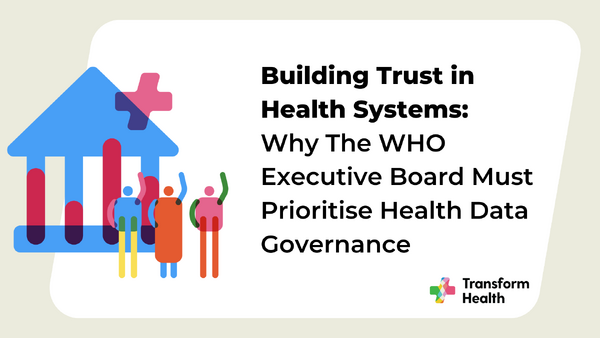
To build trust and maximise the public benefits of health data, Transform Health calls upon Member States to commit to the development of a global health data governance regulatory framework
"At the end of January, the WHO Executive Board is meeting to decide the agenda of the World Health Assembly and any resolutions to be considered. It is crucial that the pressing issue of health data governance is tabled and that a resolution to develop a global framework is on the agenda for the 76th World Health Assembly in May 2023. Health data has emerged as an essential tool for strengthening health systems and responding to future health challenges. However, national, regional and global rules to govern the collection and use of data have not kept pace with the growing potential for data to support better health and well-being, or the potential harms arising from data misuse. To harness the potential, and manage the risks, of health data sharing within and across borders, countries must work together to develop a set of common regulatory standards for the governance of health data."

Ce blog fait partie d'une série d'essais rédigés par des jeunes sur le thème "Health futures : digital first health systems for and with young people". Les opinions exprimées dans ce blog sont celles de l'auteur et non celles de la commission Lancet et Financial Times sur Governing Health Futures 2030 : Growing up in a digital world.
Il est prouvé que la numérisation a entraîné des changements fondamentaux dans les systèmes de santé. Toutefois, la transition numérique accroît la fracture numérique et aggrave les inégalités sanitaires et sociales existantes. Par exemple, la GSMA rapporte que 81 % des personnes dans les pays développés utilisent Internet, contre 40 % dans les pays en développement et 15 % dans les pays les moins avancés. Il est essentiel de tenir compte du niveau d'alphabétisation de la population en matière de santé, de la dynamique locale, des conditions sociales, culturelles et économiques, ainsi que d'autres facteurs. Nous devons comprendre les besoins en matière de santé des populations sous-représentées afin d'élaborer des solutions numériques sur mesure. En tant que génération numérique, les jeunes en particulier jouent un rôle crucial dans la transformation des systèmes de santé. Ils sont considérés comme des acteurs importants et devraient être impliqués dans les stratégies de santé numérique à toutes les étapes de la conception, de la mise en œuvre et de la gouvernance.
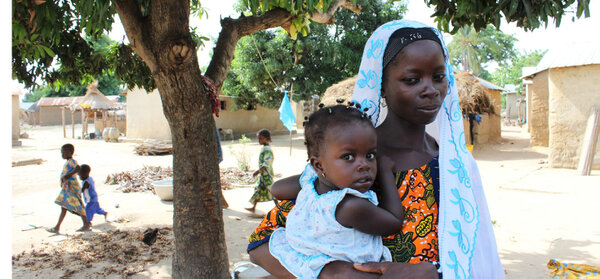
With the research results from Pakistan and Bangladesh, the four-country study of the Swiss Red Cross in Asia has come to a complete.
"Over the past three years, the Swiss Red Cross has applied a unified research framework in four countries in Asia (Laos, Nepal, Pakistan and Bangladesh) to do a qualitative study on the community perceptions of facilitators and barriers to maternal and child health. In the previous newsletters the results from Laos and Nepal have been introduced. Today’s edition focusses on the findings from Pakistan and Bangladesh, who have completed their studies in December 2022 and January 2023 respectively."

"António Guterres said that the practice of genital cutting, prevalent in some cultures for more than a thousand years, causes lifelong damage to both the physical and mental health of women and girls. It is one of the most vicious manifestations of the patriarchy that permeates our world”, he added. With more than four million girls at risk this year alone from the pernicious act of gender-based violence, urgent investment together with action is needed, so the world can reach the Sustainable Development Goals (SDGs) target of eliminating female genital mutilation by 2030, the UN chief said."

DAR ES SALAAM, 1 February 2023 - "Ministers and representatives from twelve African countries have committed themselves, and laid out their plans, to end AIDS in children by 2030. International partners have set out how they would support countries in delivering on those plans, which were issued at the first ministerial meeting of the Global Alliance to end AIDS in children. The meeting hosted by the United Republic of Tanzania, marks a step up in action to ensure that all children with HIV have access to life saving treatment and that mothers living with HIV have babies free from HIV. The Alliance will work to drive progress over the next seven years, to ensure that the 2030 target is met. Currently, around the world, a child dies from AIDS related causes every five minutes. Only half (52%) of children living with HIV are on life-saving treatment, far behind adults of whom three quarters (76%) are receiving antiretrovirals."
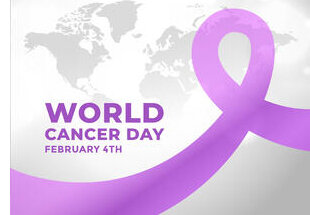
"It is easy to become despondent about global cancer. Feb 4 marks World Cancer Day, and renewed calls to “close the cancer care gap”. But the worldwide inequities in cancer care and control are deeply rooted. The facts are stark. Childhood cancer survival rates, for example, are more than 80% in high-income countries versus 20% in low-income countries. These disparities arise from huge differences across cancer prevention and care—in exposure to risk factors, in availability of public health programmes, and in access to diagnostics and treatments—compounded by growing cancer incidence. High-quality cancer services, including radiotherapy, complex surgeries, and novel treatments demand huge developments in infrastructure, workforce, education, and training, at potentially dizzying costs. Delivering them in countries with weak health systems is a daunting task. But there are pragmatic steps that can be taken."
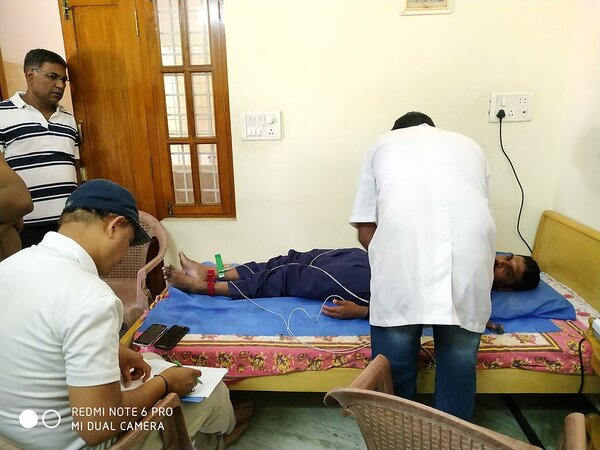
"The WHO’s report Health literacy development for the prevention and control of non-communicable diseases (NCDs) delivers practical what-to-do how-to-do guidance for health literacy development to build, at scale, contextually-relevant public health actions to reduce inequity and the burden of NCDs on individuals, health systems and economies. The key premise for health literacy development is that people’s health awareness and behaviours are linked to lifelong experiences and social practices, which may be multilayered, hidden and beyond their control. Meaningful community engagement, local ownership and locally driven actions are needed to identify health literacy strengths, challenges and preferences to build locally fit-for-purpose and implementable actions."
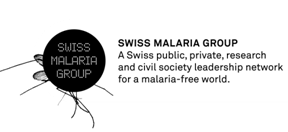
Application deadline: 10th March 2023
The Swiss Malaria Group (SMG) is a multi-stakeholder network of Switzerland-based organizations actively involved in the global fight against malaria. To run the secretariat of the SMG and to take care of its wide range of activities we are looking for an: Executive Secretary, 40% - Place of work: Basel (flexible). The tasks include: • Strategic planning and further development of SMG together with the SMG members, • Organisational management (including finances and personnel management), • Advocacy work, public relations, and networking, • Leading projects and organizing events, • Knowledge management. Further information: Martin Leschhorn, Director Medicus Mundi Switzerland, 061 383 18 14. Applications should be sent by mail to Martin Leschhorn Strebel, Director Medicus Mundi Switzerland, mleschhorn@medicusmundi.ch, by 10th March 2023.

Graduate Institute - Global Health Centre "The war in Ukraine has sparked a new kind of global health crisis. Inside Ukraine, the health impacts of the war are wide-ranging and severe, with the approaching winter raising the spectre of massive additional suffering, illness and death. At the same time, the ripple effects are being felt globally, with the rupture in food and fuel exports from the region creating serious food and energy insecurity for people in many countries. Governments that have funded the majority of global health initiatives have allocated significant resources to Ukraine, raising the question of how long and at what level financing for both will be sustained. (...) How do these converging phenomena affect the present and future of global health?"
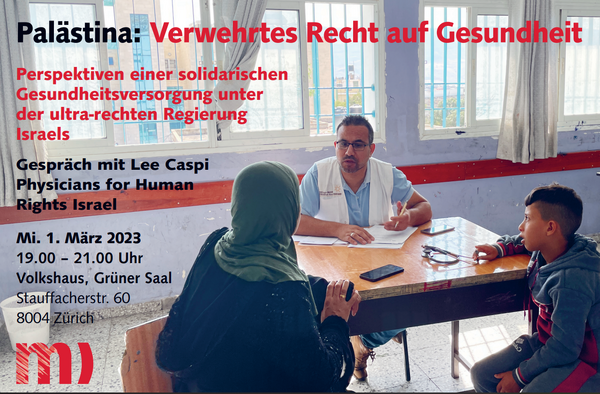
medico international "Die neue rechtsextreme Regierung Israels präsentiert derzeit ihre Regierungspläne. Wir diskutieren über die Auswirkungen, welche diese auf die palästinensische Bevölkerung in Israel und in den besetzten Gebieten haben. Bereits seit 1948 erschwert oder verwehrt die Israelische Regierung das Grundrecht auf Zugang zu medizinischerVersorgung für die palästinensische Bevölkerung. Die medico-Partnerorganisation Physicians for Human Rights Israel (PHRI) leistet seit der Intifada 1988 medizinische Hilfe vor Ort sowie politische Lobbyarbeit in Israel undinternational. (...) Im Gespräch mit medico international schweiz informiert Lee Caspi (PHRI) anhand konkreter Beispiele aus Gaza, der Westbank und Israel über die Verwehrung des Grundrechts auf Gesundheit für Palästinenser*innen. Gemeinsam diskutieren wir Perspektiven für eine solidarische Gesundheitsversorgung. Die Veranstaltung findet in Englisch und Deutsch statt mit simultaner Übersetzung."

Swiss TPH The Diploma of Advanced Studies in “Health Care and Management: From Research to Implementation” (DAS HCM) course provides international participants with the core competencies for understanding and reacting to health challenges at a world-leading institute in global and public health. Participants acquire a range of skills and knowledge needed to work as a public health professional in resource-constrained settings. With a focus on practical application and interactive training, multinational participants benefit from engaging with experts from various fields and with a diverse student body to advance their position in the health sector. - The DAS HCM can either be conducted full-time over 14 weeks or in a modular way over 2 – 3 years by doing a Certificate of Advanced Studies in “Health Research and Interventions” (CAS HRI) and a Certificate of Advanced Studies in “Health Systems and Management” (CAS HSM) and the final oral exam of the DAS HCM. The DAS HCM also serves as the core course for those who wish to pursue a Master of Advanced Studies International Health (MAS IH).

Swiss TPH "Tuberculosis (TB) remains one of the world’s deadliest diseases. Despite being a preventable and curable disease, 1.5 million people die from TB each year. To re-awake public awareness, spark the global response and drive policy change, Swiss TPH organizes a symposium in spring 2023 dedicated to TB research. Topics will include: - State of the TB pandemic - Latest on basic and applied science - Health system issues - The poverty connection - How decision makers can support progress.

Medicus Mundi Suisse Dans certains pays dans le monde, les droits sexuels et reproductifs sont sous pression. Dans certaines régions, ce sont les fondamentalistes religieux qui se mobilisent contre les droits sexuels et reproductifs. Cependant, on observe également un mouvement dans divers milieux politiques visant à remettre en question les communautés LGBTQIA+ et les droits des femmes, y compris le droit à l'avortement. Cela remet en question les droits humains fondamentaux qui sont essentiels pour garantir la santé sexuelle et reproductive.